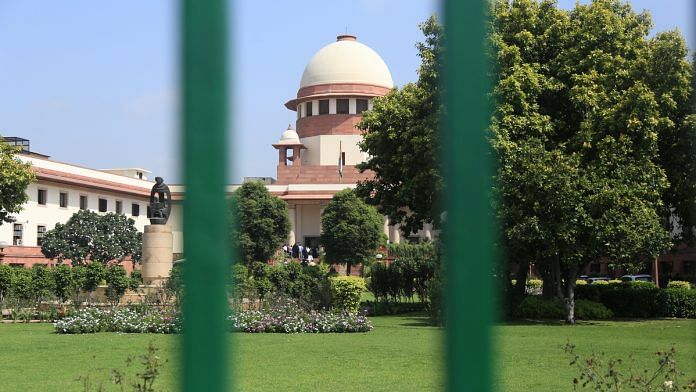New Delhi: If a lawmaker cast his/her vote in House procedings in the forenoon and is subsequently convicted in a criminal case in the afternoon on the same day, the vote would still be treated as valid for counting purposes, the Supreme Court has held.
In a judgment pronounced Friday, a bench led by Chief Justice S.A. Bobde noted that to hold a lawmaker as disqualified even before he/she is convicted would “grossly violate” his/her substantive right to be treated as innocent until proven guilty.
This principle of constitutional law, it added, is a long-standing one and cannot be taken to be displaced by the “use of merely general words.”
The entire case hinged on the interpretation of the expression “date”, and in the case at hand the court said it would mean the point of time when the event took place, rather than the whole day.
Under the Constitution and election law, an elected representative who is convicted and sentenced in a criminal case stands disqualified as a lawmaker. Consequently, such a person is not eligible to participate in House proceedings and, resultantly, cannot also cast a vote, until a court stays the implementation of both, the conviction and sentence.
Also read: Can’t disqualify convicted politicians from contesting elections for life, govt tells SC
The case
The bench’s verdict came on an appeal filed by BJP candidate Pradeep Kumar Sonthalia, who lost the biennial elections to the council of states for two seats from Jharkhand in 2018. Sonthalia had moved the court to declare the vote of Jharkhand Mukti Morcha (JMM) MLA Amit Kumar Mahto as invalid.
Mahto had voted for Sonthalia’s rival, Congress candidate Dhiraj Prasad Sahu, who won the election by one vote. Sonthalia said Mahto’s vote should not be counted since he was convicted in a criminal case on the same day he voted.
The election was held on 3 March 2018 between 9 am and 4 pm. A total of 80 MLAs cast their vote and Mahto, as per the records, voted at 9:15 am. On the same day, at 2:30 pm, a city court convicted and sentenced Mahto under various sections of the Indian Penal Code (IPC), including criminal intimidation.
The counting of votes at 7:30pm on the same day. Out of the 80 votes cast, two were declared invalid by the Returning Officer. The remaining 78 votes, which were valid, included that of Mahto, and were converted into points to declare the winner.
Sonthalia had secured 2599 votes, while Sahu, with 2600 votes, was declared the winner. The second candidate to have won was Samir Uraon who had 2601 value of votes.
Sonthalia’s had lodged his objection to Mahto’s vote at 11:20 pm, but the Returning Officer ignored it and went ahead to announce the result past midnight.
Sonthalia’s election petition before the Jharkhand High Court was also dismissed, though the court ruled in his favour to hold that Mahto’s vote was invalid. But the HC did not set aside Sahu’s election on the ground that it was not possible for the court to find out whether Sonthalia could have won, if that one vote had been rejected.
Also read: 4,442 cases against MPs & MLAs still pending in courts across India, oldest dates back to 1983
Date of commencement
Before the top court, the argument advanced by Sonthalia revolved around the meaning of the word “date.”
His lawyer, senior advocate Mukul Rohatgi, argued that a legal date commences after 12 o’ clock midnight and continues until the same hour of the following night.
His contention included a suggestion that wherever a statute uses the word “date” with reference to an event, courts have always interpreted the same to have happened at the intersection of the previous and the present day.
Therefore, it was his contention that though the court delivered its judgment of conviction and sentence at 2.30 pm on 23 March, the date of such a conviction should be deemed to have commenced at the midnight of 22-23 March. Hence, the disqualification would also commence from that time.
The bench dwelt extensively on the interpretation of the term “date,” which the court said can be used to denote occasion, time, year etc.
Significantly, the word “date” can also be used to denote a point of time etc, the bench said, quoting a dictionary.
The bench went on to hold : “To say that this presumption of innocence would evaporate from 00.01 A.M., though the conviction was handed over at 2:30 pm would strike at the very root of the most fundamental principle of criminal jurisprudence.”
The date of commencement of an event such as conviction and the consequent disqualification should also begin only from the time when the event happened, it added.
Also read: SC decision to use A4 size paper will save 2,800 trees, 1 crore litre of water annually



